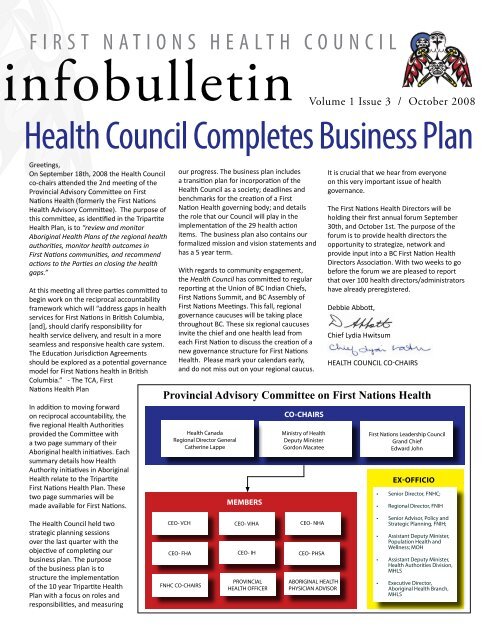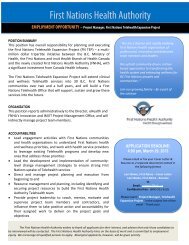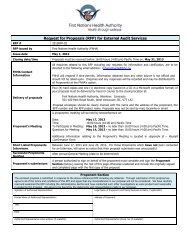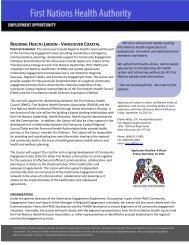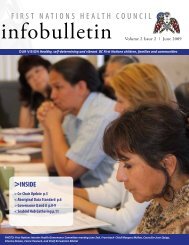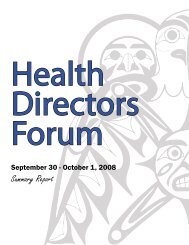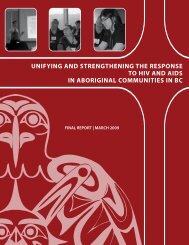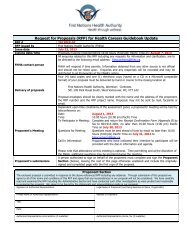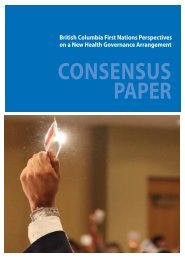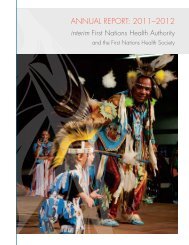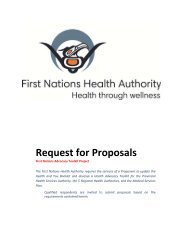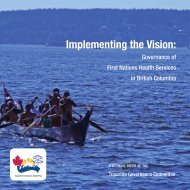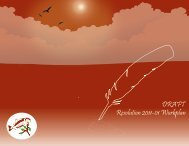FNHC Infobulletin Volume 1 Issue 3 | October 2008 - First Nations ...
FNHC Infobulletin Volume 1 Issue 3 | October 2008 - First Nations ...
FNHC Infobulletin Volume 1 Issue 3 | October 2008 - First Nations ...
You also want an ePaper? Increase the reach of your titles
YUMPU automatically turns print PDFs into web optimized ePapers that Google loves.
<strong>First</strong> <strong>Nations</strong> Health Council | <strong>October</strong> <strong>2008</strong> <strong>Infobulletin</strong> | page 3Regional Caucuses Coming SoonGovernance updateGreetings, my name is Derek Thompson andI am from the Ditidaht <strong>First</strong> Nation, locatedwithin Nuuchahnulth territory on the WestCoast of Vancouver Island. I have recentlytransitioned into the position of HealthGovernance Coordinator from GovernancePolicy Analyst with the <strong>First</strong> <strong>Nations</strong> HealthCouncil. I consider it to be a privilege andmy duty to uphold the vision and mission ofthe <strong>First</strong> <strong>Nations</strong> Health Council to implementthe Tripartite <strong>First</strong> <strong>Nations</strong> Health planon behalf of BC <strong>First</strong> <strong>Nations</strong>.Vancouver Island) in which your communityresides.In partnership with the Community HealthAssociates of BC (CHABC), Joanne Tardiff,Executive Director, will be responsible forthe overall logistical coordination for theRegional Caucus Sessions, which will includetravel (return) arrangements, hotel accommodations,incidentals, registration, andmeals for one (1) Chief per <strong>First</strong> Nation communityand for one (1) Senior Health Leadper <strong>First</strong> Nation community only. Joannecan be contacted at (250) 503-1123 directlyThe dual purpose of the dialogue is to determine whatthe specific needs are in each community in the arenas ofhealth and governance and to decide on five (5) people thatwill participate as members on the FNIHGC.Governance CaucusesDates & Locations:<strong>October</strong> 14-15, <strong>2008</strong>Kamloops<strong>October</strong> 22-23, <strong>2008</strong>Prince George<strong>October</strong> 27-28, <strong>2008</strong>TerraceNovember 04-05, <strong>2008</strong>ChilliwackAt the Gathering Wisdom for a SharedJourney Forum <strong>2008</strong> participants supportedthe <strong>First</strong> <strong>Nations</strong> Interim Health GovernanceCommittee (FNIHGC) Co-Chairs to engage ina dialogue on issues of health governancewith each of the 203 <strong>First</strong> Nation communities,and particularly with each Chief andSenior Health Lead from each <strong>First</strong> Nationcommunity. The dual purpose of thedialogue is to determine what the specificneeds are in each community in the arenasof health and governance and to decide onfive (5) people that will participate as memberson the FNIHGC. This dialogue will helpto determine a mandate for negotiationswith Health Canada and the BC Ministry ofHealth to develop, ratify and implement ahealth governance framework for BC <strong>First</strong><strong>Nations</strong>.The FNIHGC Co-Chairs will host and facilitatea two (2) day Regional Caucus Session in6 locations (see sidebar) and will providetravel (return), meals and accommodationsfor one (1) Chief per <strong>First</strong> Nation communityand for one (1) Senior Health Lead per <strong>First</strong>Nation community only. Each Chief andSenior Health Lead will attend a RegionalCaucus Session within the Health Authority(North, Interior, Fraser, Vancouver Coastal,and arrangements can be made through theCHABC.Preceding the Regional Caucus Sessionseach <strong>First</strong> Nation community will receive anagenda, outline and workbook for the two(2) day caucus session within your given regionand depending on which city and datesyou will be attending. This information willbe mailed and electronically provided to youwithin the first week of <strong>October</strong> <strong>2008</strong>.The FNIHGC Co-Chairs and the <strong>First</strong> <strong>Nations</strong>Health Council are excited at the opportunityto work with all of the Chiefs and SeniorHealth Leads of all 203 BC <strong>First</strong> <strong>Nations</strong>.The possibility for great change and thestrengthening of health services is underpinnedby BC <strong>First</strong> <strong>Nations</strong> resiliency anddetermination. We look forward to meetingwith each of you and listening to your ideas,thoughts and interests.If you have any questions or require furtherinformation please contact me. Thank youfor your time and consideration.In The Spirit Of Our Ancestors,Derek ThompsonHealth Governance Coordinator604.926.9903DThompson@fnhc.caNovember 12-13, <strong>2008</strong>VancouverNovember 17-18, <strong>2008</strong>NanaimoTravel expenses, mealsand accomodations willbe provided for (1) Chiefand (1) Senior Health Leadper <strong>First</strong> Nation.Questions:Travel & AccomodationsJoanne Tardiff(250) 503-1123Other: Derek Thompson(604) 913 9903
<strong>First</strong> <strong>Nations</strong> Health Council | <strong>October</strong> <strong>2008</strong> <strong>Infobulletin</strong> | page 4Community Spotlight: Ktunaxa <strong>First</strong> NationAbout the Ktunaxa NationKtunaxa citizenship is comprised of Nationmembers from seven Bands located throughouthistoric traditional Ktunaxa territory. FiveBands are located in British Columbia, Canadaand two are in the United States. ManyKtunaxa citizens also live in urban and ruralareas “off reserve”. Ktunaxa (pronounced‘k-too-nah-ha’) people have occupied the landsadjacent to the Kootenay and Columbia Riversand the Arrow Lakes of British Columbia,Canada for more than 10,000 years. In totalthe Ktunaxa Nation is comprised of approximately5,000 individuals, though a census tobe carried out next year will clarify this numberfurther.Creating a Governance ModelThe Ktunaxa Nation is putting governancefirst. Over the past 9 years the Ktunaxa havedeveloped a governance model that combinestraditional governing structures, indigenouspedagogy, and fiscally accountable checksand balances. The model was developed overa decade through a grassroots process ofcommunity meetings, focus groups and sectorspecific workshops.“At the time that we entered the treatyprocess we did two things,” comments GwenPhillips, Governance Transition Coordinator,“we committed to exercising personal andgeographic jurisdiction over our land and ourpeople, and at the same time committed to acommunity development agenda.” A communitydevelopment agenda commits us toconsulting with our citizens and acting upontheir recommendations on a consistent andfrequent basis. We havewhat we refer to as acitizen-driven processthat guides our treaty negotiations.The existingCouncils direct governancetransition, basedon the people’s agenda.The cornerstone of thisagenda is the notion that“you can only move as fast as the people.”The Ktunaxa have organized their nation into 5sectors including: Social Investment, TraditionalKnowledge, Corporate Services, Land &Resource Stewardship, and Economic Development& Investment Planning. Each sector isgoverned by a sector specific council composedof individuals with expertise that sectorarea. The role of the sector council is to “Providestrategic direction for government.” Inthe future, each sector councilwill be governed by a Chief whohas experience and expertise intheir given area. This model, 9years in the making is currentlybeing adopted by the Ktunaxa.A Ktunaxa constitution is alsoin the works and is expected tobe completed next year. Whenasked why the Ktunaxa have focusedso strongly on governanceGwen comments: “I think for usthe important thing is to knowyour limits. You set the outmostboundaries for what you can doas a nation and to know wherethose boundaries are. You don’thave to exercise jurisdictionin all of those areas, but it is ahuge learning opportunity tofind out where those limits lay.Then you have choice.”“We have what we refer to as a citizen-driven process thatguides our treaty negotiations. The existing Councils directgovernance transition, based on the people’s agenda. Thecornerstone of this agenda is the notion that “you can onlymove as fast as the people.”The Ktunaxa NationSocial SectorAn important step in building agovernance model is establishingthe core ideas/principlesthat your government willadhere to and promote. Theseideas, also serve to define the populations thatyou intend to serve. Early on in the process theKtunaxa developed the following guiding principlesfor the delivery of Aboriginal health andwellness services by the Ktunaxa government:• Authority for health planning in the KtunaxaTraditional Territory and the associated administrationof resources will rest with the KtunaxaNation.• The interests of all Aboriginal people wholive in Ktunaxa Territory will be represented inall (regional) Health Planning sessions.• All Aboriginal people will be eligible to accessthe same level of services regardless of statusor residency.• Common Aboriginal values will be integratedinto planning and service delivery.• All Aboriginal people of this area will worktogether, nurturing and celebrating our commonidentity.Through the development of these principles,the Ktunaxa define their role as being responsiblefor health planning for all Aboriginalpeople within their traditional territory. Asthere are no friendship centres and very fewAboriginal organizationswithin the Ktunaxaterritory, the Nation hasmade a commitmentto ensuring that theinterests of all Aboriginalpeople are includedin their processes.Seats have been madeavailable on KtunaxaBoards and committees for Métis and Urbanrepresentatives, as required. When planning,special sessions have been held in keylocations throughout their territory, to permitoff-reserve Aboriginal people to participate.PartnershipsCollaboration and Partnerships are necessaryingredients in the delivery of quality healthcare, especially for many small <strong>First</strong> <strong>Nations</strong>.The Ktunaxa are currently concluding a Letter
<strong>First</strong> <strong>Nations</strong> Health Council | <strong>October</strong> <strong>2008</strong> <strong>Infobulletin</strong> | page 5Putting Governance <strong>First</strong>of Understanding LOU with Interior HealthAuthority that sets out an administrative arrangementfor the two parties. “We have justabout concluded our LOU with IH. Through thisprocess we determined that two levels of relationshipdocuments were required,” says Phillips,“The nature of IH’s authority is delegatedauthority of the crown. We are negotiating aletter of understanding with IH as an agent ofthe crown, and a service delivery body, andthen we will negotiate an MOU with Provincethemselves on the jurisdiction side.”can’t run a hospital, but we can put in placepatient navigators to making those hospitalstays a lot better for our people.”The VisionWith rural school and hospital closures becomingthe norm, health service delivery for“I think for us the important thing is to know your limits. You setthe outmost boundaries for what you can do as a nation and to knowwhere those boundaries are. You don’t have to exercise jurisdictionin all of those areas, but it is a huge learning opportunity to find outwhere those limits lay. Then you have choice.”rural and remote citizens, both Aboriginal andnon-Aboriginal is becoming a major concern.Patient travel already consumes 50% of most<strong>First</strong> <strong>Nations</strong> Health budgets, and the travelinvolved can be tiring and stressful for bothpatient and family. The Ktunaxa are looking atways of bringing health service delivery closerto home through integration and co-locationof services across the Ktunaxa territory. TheKtunaxa recently met with the Deputy Ministerof Children and Families who agreed thather ministry must find a new way of funding,to reflect the Ktunaxa’s authority as a Nation,to provide child and family services to theircitizens and other Aboriginal people who maketheir home within Ktunaxa territory.Overall, the Ktunaxa have set their sights onplaying a large role in health service delivery inthe future, not only for Ktunaxa people, but fornon-Aboriginal residents as well. “<strong>First</strong> <strong>Nations</strong>people aren’t going anywhere.” states Phillips“the provision of rural health services belongswith us, we are the stable, and growingpopulation in every rural region across BritishColumbia.”Purpose of Ktunaxa/IH LOU• To develop and implement a regionalhealth plan• To look at policy for the allocation ofresources• To administer and allocate grants forhealth services in the region• To develop and implement regionalstandards• To monitor and evaluate provincial andregional standardsWith health care currently consuming aroundone third of BC’s annual budget, economiesof scale are always considered in programdevelopment and budget allocations. “Wedon’t have a lot of money and we are not goingto have a lot of money as a self governingnation. When you look at governance thereare costs attached, administrative costs, andenforcement costs. We are trying to figureout just what it is that we will need to havejurisdiction over, in order to meet our needs.We don’t need to have law-making authorityover everything; only those things where ourinterests won’t be met under someone else’sjurisdiction. We see co-management agreementsbeing very important to us. What weneed is to come to a place where those largersystems respect who we are, and our history inour ancestral homelands, where they becomewilling to relinquish controls in those areasthat need to be under our control because werequire that authority and can do it better. We
<strong>First</strong> <strong>Nations</strong> Health Council | <strong>October</strong> <strong>2008</strong> <strong>Infobulletin</strong> | page 6active healthy strong free from tobacco misusePROVINCIAL TRAINING EVENT – <strong>October</strong> 20 - 23, <strong>2008</strong>2009 Honour Your Health Challenge Coast Plaza Hotel and Suites, 1763 Comox Street, Vancouver, BCTrain to be an Honour Your Health Challenge Coordinator and lead your Aboriginalcommunity, group or students in the upcoming 2009 Honour Your Health Challenge.Sun Run InTraining Programgrants • prizes • incentivesWhat is the Honour Your Health Challenge?A minimum 6-week Health Challenge beginning January2009 featuring prizes and grant opportunities. The HYHCencourages individuals and communities to promote:• healthy eating;• increased physical activity;• decreased tobacco misuse;• healthy pregnancies.Who should attend the training?If you are an employee or volunteer with a special interestin promoting health and wellness, then this training event isfor you.<strong>October</strong> 20, <strong>2008</strong> – If you have never attended our <strong>October</strong>training event before, this first day of training will provideyou with:• an orientation to the Honour Your Health Challenge.• some general program ideas and resource lists to helpyou with planning your Challenge.<strong>October</strong> 21 – 23, <strong>2008</strong> – Once you have completed yourmandatory first day of training OR if you have already been toone of our training sessions in the past, these 2-1/2 days oftraining will provide more opportunities for learning, sharingand skill building in areas of special interest to you.Confirmed presenters this year include:• Active Communities!• Action Schools! BC• SportMedBCRegister now – it’s free!There is no cost for the training. Completethe attached registration form and fax to(250) 483-5935.Sponsorship for travel and accommodationis available!Each community or organization may registermore than one participant. However, we areable to provide reimbursement for travelexpenses and hotel accommodation for oneperson per organization only. We encouragesharing travel expenses if more than oneperson per organization will be attending.Questions? Contact:Denise LecoyProvincial CoordinatorHonour Your Health ChallengePhone: (250) 216-4576Fax: (250) 276-4707E-mail: Denise.Lecoy@gov.bc.cawww.honouringourhealth.caThis training event is sponsored by BC Ministry of Health – Aboriginal Health Branch
<strong>First</strong> <strong>Nations</strong> Health Council | <strong>October</strong> <strong>2008</strong> <strong>Infobulletin</strong> | page 7<strong>First</strong> <strong>Nations</strong> ActNow Update>>Healthy SchoolsSteps are being taken that will help fosterhealth promotion and learning in <strong>First</strong> NationSchools. By improving and helping to provideculturally appropriate supportive environmentsfor <strong>First</strong> <strong>Nations</strong> children. Partnershipshave been created with Action Schools! BCand the <strong>First</strong> <strong>Nations</strong> Schools Association.These partnerships will enhance and promotethe ActNow strategy within FN schoolsin BC. Original discussions have transformedinto a joint initiative between Action Schools!BC and the FN ActNow program. A MoU willbe signed this fall, a new joint position hasbeen created and a new hire will be on theteam as of <strong>October</strong>.>>Development of CommunityToolkitsCommunity toolkits are being developedwhich address the target areas of the <strong>First</strong>Nation ActNow strategy. These toolkits willprovide communities with the resources andtools needed to implement health promotionstrategies, as well as, to enhance existingprograms. This valuable collection of resourceswill cover topics on physical activity,nutrition, and prenatal and maternal health.The kits will also contain references that tiethese topics in our traditions and communities.A draft toolkit will be together by theend of September. Pilot projects will be runningand evaluated this fall.>>Poster CampaignIn partnership with Four Host <strong>Nations</strong> Secretariata poster campaign for <strong>First</strong> <strong>Nations</strong>communities is underdevelopment. Thecampaign will highlight professional level AboriginalAthletes from British Columbia.>>Aboriginal Sports, Recreation,and Physical Activity PartnersCouncilMembers: ASRA, BCAAFC, MNBC, <strong>FNHC</strong>,Cowichan <strong>2008</strong>Building on the Youth Declaration, the Partnersgroup developed a 5 Pillar strategy toincrease access and participation in sports,recreation, and physical activity opportunitiesfor Aboriginal peoples in BC. The Councilis working on an operational strategy thatresponds to the health needs of Aboriginalpeoples to improving health outcomes.>>Capacity BuildingThe <strong>First</strong> <strong>Nations</strong> Leadership Council, <strong>First</strong><strong>Nations</strong> ActNow, Kid Sport, Sport BC met todiscuss shared commitment and a vision tocreate a more meaningful and productivepartnership for improving and promotingSport and Recreation in British Columbia’s<strong>First</strong> Nation communities across the province.We are working together to explorenew methods of supporting <strong>First</strong> <strong>Nations</strong>Healthy Eating Guidelinesfor <strong>First</strong> <strong>Nations</strong>Nutrition UpdateGreetings to all of our dedicated peoplein community health! The summer hasbeen busy and enjoyable as I have had theopportunity to get out to a few gatheringsand events. Thankyou to those whohave extended theinvitation.As I work for theHealth Councilonly three daysper week, we havegained the assistanceof a contractnutritionist (KarenFediuk RD, MSc.)to help implementseveral of thenutrition programactivities includingthe development ofsome healthy eatingguidelines that willassist communities and organizations to developtheir own community foods policies.In my work with the Health Council I amdeveloping a tool to gather input fromcommunities with respect to communityassets and needs with the intention of usingthis information (along with what we heardat “Gathering Wisdom” and what we willyouth in the area of Sport and Recreation,and to provide additional opportunities.>>NAIGIn support of the Cowichan <strong>2008</strong> NorthAmerican Indigenous Games in the CowichanValley, British Columbia. The <strong>First</strong> <strong>Nations</strong>ActNow program supported the coststo bring Speakers Billy Mills and Dr. Evan Adamsto the symposium event, and provided ahealthy lunch for the event.hear as the community hubs begin to cometogether) to guide future nutrition relatedprograms.In addition, the Health Council is workingwith the Canadian Diabetes Association andthe Honour Your Health Challenge to createmore opportunities for our communities toreceive training to implement a “Food Skillsfor Families” cooking and nutrition program.For more information on this or any otheractivities mentioned, please contact me byphone 778-227-4455 or email: sjohnson@fnhc.ca. Way’ Suzanne Johnson
<strong>First</strong> <strong>Nations</strong> Health Council | <strong>October</strong> <strong>2008</strong> <strong>Infobulletin</strong> | page 9News in BriefGEGENOATATOLTIMG:Sharing the KnowledgeDr Georgia Kyba attended GEGENOATATOLT-IMG: Sharing the Knowledge Gathering. ThisTraditional healing event was co-hosted byThe <strong>First</strong> Nation Centre at National AboriginalHealing Organization, NAHO, and ElsipogtogHealth and Wellness Centre(EHWC).This event took place at Elsipogtog <strong>First</strong><strong>Nations</strong> in New Brunswick from Sept 8 to 15at their Health Centre. This reserve is thelargest in New Brunswick, accommodating3000 members.The Health Centre focuses on integratingtraditional knowledge and science throughtheir programs and delivery. Sharing theKnowledge Gathering held workshops inthe Health Centre’s healing lodge room, aroom built for traditional ceremonies. Thesurrounding grounds contain 2 teepees, andone sweat lodge for ceremonies.Throughout the day many traditional teachingstook place, such as women’s teachings,Medicine Wheel teachings, Elder’s circleteachings, Integrating traditional medicinewith western teachings, as well as manyothers talks throughout the week. Also occurringeveryday were sweats, traditionalhealing, massage, energy work, and medicinewalks. A couple hundred people fromacross Canada attended this event.GEGENOATATOLTIMG: Sharing the KnowledgeGathering is an inspiration for a futureTraditional Gathering in BC. Dr Kyba plans tocollaborate with NAHO and BC <strong>First</strong> Nationelders and healers for further planning.Please feel free to contact Dr Kyba withinformation or comments at gkyba@fnhc.caHealth AdvocateHello, to all BC <strong>First</strong> <strong>Nations</strong> individuals, communitiesand organizations. My name is Allison Ducharme.I am an urban Aboriginal woman (born and raised inVancouver, BC). My maternal lineage is Interior Salishfrom In-SHUCK-ch Nation (Samahquam Band),and my paternal ancestry is Ojibway from Mud Lake,Ontario.I have been actively involved within the social services,criminal justice system and health fields forapproximately ten years. The various roles that I haveperformed have entailed advocacy in various capacities.Therefore, I possess astute advocacy awareness,knowledge, and experience. Most significantly, I possessa passion for advocacy involvement.I feel very honoured and privileged to join the <strong>First</strong> <strong>Nations</strong> Health Council team asHealth Advocate. I look forward to working diligently to provide advocacy and supportto <strong>First</strong> <strong>Nations</strong> individuals, communities and organizations as Health Advocate for <strong>First</strong><strong>Nations</strong> Health Council. “Allison will be working from her home office in Vancouver and can be contacted as follows:Phone: 604-787-4159Email:aducharme@fnhc.caPolicy AnalystPATRICIA A. WILSON, Policy AnalystPatricia is from the North Okanagan Valley, she belongsto the Okanagan Indian Band, a large InteriorSalish community near Vernon, BC. Her family isOkanagan-Secwepemc with family ties to Glenedenwith spouse, Sonny and their son, Derek.Patricia holds a Bachelor degree in Social Work withdistinction from the University of Victoria. She iscompleting an Associate Certificate from the JusticeInstitute in Leadership and Conflict Resolution. Patriciabrings strong leadership in advocacy, education,social development and child and family services inher lengthy career as a professional social worker.She will be working with the Union of BC Indian Chiefs Social Development Committeeand collaborating with the <strong>First</strong> <strong>Nations</strong> Health Council. In her capacity as a policyanalyst, Patricia will be providing direction, technical support and leadership in socialdevelopment and health areas.Patricia WilsonPhone: 604.684.0231
<strong>First</strong> <strong>Nations</strong> Health Council | <strong>October</strong> <strong>2008</strong> <strong>Infobulletin</strong> | page 10North American Indigenous Games<strong>2008</strong> – August 3-10, <strong>2008</strong>The NAIG games were a success and so wasthe information booth for the <strong>First</strong> <strong>Nations</strong>Health Council and Health Careers Recruitment.Much interest was shown in our materialand promotional items, such as post-itpens, picture frame magnets, pedometers,wellness diaries and stainless steel waterbottles; thus, drawing attention from all agegroups.One of the biggest hits was the pedometercombined with a wellness diary. Traffic atthe booth was steady with approximately100+ visitors a day. About 90% of thepeople visiting the booth were unaware ofthe <strong>First</strong> <strong>Nations</strong> Health Council or how theTripartite Agreement affected them. Commonquestions/comments included the difficultiesthose are having in access to visionand dental care with the new policies withup front payment. Others expressed lackof access and funding for EHS in their areaendangering low income families health. Afew other comments were made that due toa lack of resources their video-conferencingequipment is not being used to its neededcapacity.HIGHLIGHTS>>The Health Council boothdrew over 1000 visitorsover the course of thegames>>Information sharing aboutthe Tripartite Health Plan,and Health Careers>>34 potential BC <strong>First</strong><strong>Nations</strong> health careersstudents identified.Health Careers Recruitment officer Erin Mearns (Klahoose <strong>First</strong> Nation) was on hand at the NAIGand spoke to many <strong>First</strong> <strong>Nations</strong> youth and adults about the opportunities in Health Careers.All questions/comments posed weredirected to the appropriate contact of the<strong>First</strong> <strong>Nations</strong> Health Council for further assistance.Despite the lack of awareness of theHealth Council or TripartiteAgreement, people wereeager to find out, collectedmuch of our information andwere excited to see what thefuture holds.With an attractive new banner,the Health Careers tableadjoined to the Health Council table waseven busier. An activity to increase awarenessof the need for aboriginal people toenter health careers was carried out withthe incentive of giveaways. This provedmuch success and we witnessed othersbringing family members and friends toparticipate at a later time. Parents, grandparentsand youth took much interest in notonly our ‘future health professional’ pictureframe magnets, but also the Health CareerGuidebooks. Approximately 320 guidebookswere handed out and all 1000 magnets weregiven away.It was overheard from other attendeeswitnessing young children were statingthey wanted to be doctors when theygrow up.It was overheard from other attendeeswitnessing young children were stating theywanted to be doctors when they grow up.Prospective health career students contactinformation was recorded and they werealso rewarded with stainless steel waterbottles. Those enrolled in a health careeror close to it also received usb bracelets. Intotal 34 potential BC <strong>First</strong> <strong>Nations</strong> healthcareer students were identified.
<strong>First</strong> <strong>Nations</strong> Health Council | <strong>October</strong> <strong>2008</strong> <strong>Infobulletin</strong> | page 11Red Cross Partnership provides<strong>First</strong> <strong>Nations</strong> TrainingThrough a Memorandum ofUnderstanding between the CanadianRed Cross and the Assemblyof <strong>First</strong> <strong>Nations</strong>, the <strong>First</strong> <strong>Nations</strong>Health Council has been workingwith the Canadian Red Cross B.C.regional office to develop strategiesin the areas of water safety,violence, and first aid.One of our action items in theTransformative Change Accordis to improve <strong>First</strong> Responderprograms in rural and remote <strong>First</strong><strong>Nations</strong> communities. Along withthe Red Cross, we are currentlydeveloping a 3-5 year plan to havefirst aid training brought to allcommunities.Through the Mental WellnessProgram, Jody Olsson, <strong>First</strong> <strong>Nations</strong>Health Council’s WellnessCoordinator, and the Red Crossare developing a pilot project totrain crisis responders in RespectEd.The Red Cross’s programteaches how healthy relationshipslook and feel, how to recognizesigns of abuse, dating violenceand harassment, and how to gethelp. Through, “Walking the Pre-vention Circle” the program recognizesthe challenges of Aboriginalindividuals in communities and ismodified to reflect the unique andhistoric experiences of our communitiesby providing a culturallens to training.One area of concern raised at theGathering Wisdom forum waswater safety while participatingin fishing or swimming. Therefore,In the near future, we willbe working with the Red Cross toprovide some water safety trainingto our communities.The Canadian Red Cross hasbecome a keen participant in thehealth and safety of <strong>First</strong> <strong>Nations</strong>and we look forward to developinga strategic long-term plan inthe areas of injury prevention. Ifyou would like more informationon these or any programs, pleasefeel free to contact our office. Ifyou would like to discuss programsthe Red Cross can provideto your community individually,please contact the Aboriginal staffperson in your region.Explore initiativeareas, reports,communityengagementand fundingopportunitiesavailable throughthe <strong>First</strong> <strong>Nations</strong>Health Council.Visit us online atwww.fnhc.caBC Aboriginal Coordinator Contact ListLOWER MAINLAND REGION(Lower Mainland, Whistler, Pemberton, Sunshine Coast, FraserValley to Boston Bar)Aboriginal Advisor: Michael CookDirect Phone Line 604.709. 6646Email: michael.cook@redcross.caAddress: 3400 Lake City Way, Burnaby BC V5A 4Y2Phone: 604.709.6600 Toll Free: 1.800.565.8000Fax: 604.709.6675COASTAL REGION(Vancouver Island, Gulf Islands, Haida Gwaii, Bella Bella, BellaCoola, Ocean Falls, Powell River)Aboriginal Community Development Coordinator:TELAXTEN (Paul Sam)Direct Phone Line 250.995.3506Email: paul.sam@redcross.caAddress: 909 Fairfield Road, Victoria BC V8V 3A3Phone: 250.382.2043 Toll Free: 1.800.661.9055Fax: 250.382.3420BC SOUTHERN INTERIOR REGION(Osoyoos north to 100 Mile; Fraser River at Lillooett east toAlberta border & south to US border; Fraser River south to Lytton& southeast to Osoyoos & US border)Aboriginal Outreach Advisor: Joyce KenorasDirect Phone Line 250.832.6541Email: joyce.kenoras@redcross.caAddress: #5-1414 Hunter Court, Kelowna, BC V1X 6E6Phone: 250.763.1859 Toll Free: 1.800.661.3308Fax: 250.763.6131NORTHERN BC and YUKON TERRITORY REGION(north of Williams Lake and Yukon Territory)Aboriginal Outreach Coordinator: Cameron LauderDirect Phone Line 250.564.6566Email: cameron.lauder@redcross.caAddress: 1399 – 6th Avenue, Prince George, BC V2L 5L6Phone: 250.564.6566 Toll Free: 1.800.278.7717Fax: 250.564.2688After hours emergency answering service* 1.888.800.6493
<strong>First</strong> <strong>Nations</strong> Health Council | <strong>October</strong> <strong>2008</strong> <strong>Infobulletin</strong> | page 12Vision Screening Rollout this FallHealth Eyes are important to a child’s learning.Some vision problems can be hard to notice andneed to be corrected at an early age. Many childrendo not know that they have a vision problemas changes in a child’s vision happen very slowly. Achild may thank that everyone sees the same way.Vision screening for Aboriginal children under agesix (on and off-reserve) is one of the 29 actionitems in the Tripartite <strong>First</strong> <strong>Nations</strong> Health Plan.The <strong>First</strong> <strong>Nations</strong> Health Council, <strong>First</strong> <strong>Nations</strong>School Association and Ministry of Healthy Livingand Sport are working together to ensure that allkindergarten children in <strong>First</strong> <strong>Nations</strong> schools receivevision screening which will identify and referchildren with vision concerns that could affect achild’s health and learning.During the <strong>2008</strong>-2009 school year health authoritystaff will be offering vision screening servicesto all kindergarten age children attending <strong>First</strong><strong>Nations</strong> schools and public schools. Public healthstaff from the local health authority will be partneringwith <strong>First</strong> <strong>Nations</strong> schools to carry out thescreening.Parents will receive information about the programand will be able to indicate their agreementfor their children to participate. OCAP (Ownership,Control, Access, and Permission) standards will applyto this data, and the program will be evaluatedto ensure it meets the needs and aspirations of<strong>First</strong> <strong>Nations</strong> Community Health.To support <strong>First</strong> <strong>Nations</strong> communities, we havepurchased 10 vision screeners for use in <strong>First</strong><strong>Nations</strong> communities. As well, we are conductingTrainer of Trainer for vision screening onNovember 4 and 5. The training is in partnershipwith Dr. Barry Lester and National CollaboratingCentre of Aboriginal Health. The training willfocus on the basic knowledge about the eye andthe Welch Allyn vision screener, which can detectvision problems at an early age. We are workingwith the health authorities to be able to provide apracticum setting for the trainees to practice usingthe vision screener.The Trainer of Trainer Training is for those communitiesthat have a minimum of 20 children in theircommunities from 3 to 6 years old. These Trainerswill then be able to provide training in their regionand will be asked to conduct one training in theirregion.For more information about Vision Screening,please contact Marilyn Ota at mota@fnhc.ca.Governance Policy AnalystCommunity DevelopmentMark Martthew, Community Development LiaisonWeytk, my name is Mark Matthew from the Simpcw <strong>First</strong> Nation. I grew up onthe North Thompson reserve located 15 km north of Barriere, BC. I now live inKamloops with my wife and young son. I havea Bachelors of Business Administration fromThompson Rivers University and experience as aBusiness Development Officer (at an AboriginalFinancial Institution) and a Financial Advisor.Most recently I was employed with InteriorHealth as the Aboriginal Contracts Advisor.My role within the <strong>First</strong> <strong>Nations</strong> HealthCouncil is the new Community DevelopmentLiaison. I am looking forward to getting outinto the communities and assisting in theimplementation of the Tripartite <strong>First</strong> <strong>Nations</strong>Health Plan (TFNHP). My position will providea wide range of community and organizational development skills to assist <strong>First</strong>Nation either independent or in a community engagement hub to plan, collaborateand communicate with <strong>FNHC</strong>. As well as assist <strong>First</strong> Nation communities in thedevelopment of community health plans and work plans.Mark Matthew BBAmmatthew@fnhc.caAndrea Glickman, Governance Policy AnalystAndrea recently completed a Master’s degreein Community Development at University ofCalifornia-Davis. Her research focused on raceand class among agricultural workers in centralCalifornia, and separately, on decolonization inGuyana. She taught a class on race and ethnicityat U.C.D., and worked with students on researchmethods and community engagement. Prior tothat she worked in Ecuador and India for twoyears on public health and community economicdevelopment projects in rural areas.Andrea is from Vancouver, and worked in the Downtown Eastside for severalyears with a peer-based needle exchange outreach project. She holds a B.A. inAnthropology from U.B.C. and worked at the Museum of Anthropology. Sheis passionate about social justice and advocacy, as well as health. Andrea lovesto spend time in the forest and mountains, and is happy to be back in BritishColumbia with her family and friends. Andrea be reached at 604.684.0231
<strong>First</strong> <strong>Nations</strong> Health Council | <strong>October</strong> <strong>2008</strong> <strong>Infobulletin</strong> | page 13This three-day conference hosted by theAFN will provide a suite of practical tools,and hands-on skills training through workshops,presentations, lectures and questionand-answersessions. The forum will alsooffer an opportunity to network with other<strong>First</strong> <strong>Nations</strong> Health Managers and <strong>First</strong><strong>Nations</strong> leadership from communitiesacross the country. English and Frenchtranslation will be available.Who Should AttendThis forum is for <strong>First</strong> Nation Health Managersworking in communities and TribalCouncils. In addition, it is open to othersserving <strong>First</strong> <strong>Nations</strong> in the health field,including Chiefs and Councilors.Sponsorship for FNHMsThe AFN will sponsor 450 <strong>First</strong> NationHealth Managers on a first-come-first-serveregional basis to attend the conference.Registration opens in <strong>October</strong>, and closes onNovember 14, or before if the 450 spots arefilled. Watch for the full registration packagein <strong>October</strong>. Sponsorship per region is basedon population, and breaks down as follows:BC 104 ON 104AB 31 QC 63SK 63 ATL 31MB 42 Yukon/NWT6/7A <strong>First</strong> <strong>Nations</strong> health manager:• Works in a FN community or tribalcouncil.• Usually has the title of CEO, healthdirector or coordinator or manager.• Has the role of managing a communityhealth facility, addictions treatment centre,health centre, and health programs.• Has the responsibility for managementof health human resources, financialresources, and health programs.Sponsorship includes the registration fee,flights and hotel in Vancouver. Travel willbe arranged through the AFN only aftersponsorship is confirmed. There will be noreimbursement for travel arrangements thatare made privately.RegistrationThere are early-bird discounts on registrationfees:BEFORE NOVEMBER 14Early-bird registration is freeNOVEMBER 15 - JANUARY 1Registration fee of $150Free Registrationbefore November 14!2nd National ConferenceJanuary 27-29, 2009, in Vancouver, BCJANUARY 2 – JANUARY 20Registration fee of $300AFTER JANUARY 20Registration available at the door only, $400Please note that registration fees reflectescalating costs and no exceptions will bemade. The registration fees include: comprehensiveworkshop materials, networkingreception on Monday night, daily lunchesand refreshment breaks, banquet and awardsceremony on Wednesday night.How to RegisterRegistration packages will be issued in <strong>October</strong>by e-mail and online at the <strong>First</strong> <strong>Nations</strong>Health Managers website at www.fnhealthmanagers.ca. You may register online or byfax starting in early <strong>October</strong>.ContactFor more information, please contact OdessaBelanger at (866) 869-6789 ext. 222, or byemail obelanger@afn.ca.
<strong>First</strong> <strong>Nations</strong> Health Council | <strong>October</strong> <strong>2008</strong> <strong>Infobulletin</strong> | page 14Health Survey Participants up 400%The <strong>First</strong> <strong>Nations</strong> Regional Health Survey iscoming to your <strong>First</strong> <strong>Nations</strong> community!To date, 75% of the signed <strong>First</strong> <strong>Nations</strong> RegionalLongitudinal Health Survey (RHS) CoreSample Consent formshave been returned tothe <strong>First</strong> <strong>Nations</strong> HealthCouncil (<strong>FNHC</strong>). Thiswill now enable <strong>FNHC</strong>to officially launch theRegional Health Surveydata collection for<strong>2008</strong>.The Core Sample is the original <strong>First</strong> <strong>Nations</strong>communities who participated in the RHSback in 2002/2003. Of the 38 <strong>First</strong> <strong>Nations</strong>communities who participated, 4 <strong>First</strong> <strong>Nations</strong>communities have opted not to participatein the <strong>2008</strong> RHS Phase.Approximately 38 <strong>First</strong> <strong>Nations</strong> communitieswill be participating in the New Sample.Contact was initiated with these selected<strong>First</strong> <strong>Nations</strong> communities and we requestthat you please have the RHS Consent formssigned and returned back to the <strong>FNHC</strong> officeas soon as possible.If your community has been contacted andwould like an informational session on theRegional Health Survey, very limited informationalsessions can be accommodated.So please email our office ASAP to book aninformation session.We are aiming to set the first week in <strong>October</strong><strong>2008</strong> to have our first Data CollectionTraining session in Vancouver, BC to be subsequentlyfollowed by the next training sessionto be held in Nanaimo, BC. ConsecutiveRHS data collection training sessions will heldin receipt of other signed RHS consent formsreturned to <strong>FNHC</strong> office.49 RHS Data Collectors will be participatingin the 2 RHS Training Sessions in early <strong>October</strong>.These data collectors will be hired fromeach of the participating RHS <strong>First</strong> <strong>Nations</strong>communities. Interviews for these positionswill be facilitated in collaboration with ourRegional Health Survey office.Overall, 7400 Regional Health Surveys willbe completed in total in comparison to the1,944 Regional Health Surveys completed inthe 2002/2003 RHS Phase. This will be almost4 times the amount of survey respondentsfor <strong>2008</strong> Regional Health Survey.Overall, 7400 Regional Health Surveys will be completedin total in comparison to the 1,944 Regional HealthSurveys completed in the 2002/2003 RHS Phase.To determine if your <strong>First</strong> <strong>Nations</strong> communityhas been selected in the New RHS Sample,please contact our office at your earliest convenience.For further details via email, pleasecontact Regional Health Survey CoordinatorDavid Clellamin dclellamin@fnhc.ca or AssistantRHS Coordinator Amanda Williams awilliams@fnhc.caThanks to all the <strong>First</strong> <strong>Nations</strong> communitieswho have been working hard at recruitingtheir data collectors and we anxiously lookforward to their hard work in collecting theRegional Health Survey data for <strong>2008</strong>!The <strong>First</strong> <strong>Nations</strong> Regional LongitudinalHealth Survey is <strong>First</strong> <strong>Nations</strong> owned andcontrolled by <strong>First</strong> <strong>Nations</strong> for <strong>First</strong> <strong>Nations</strong>.Data collected from the Regional HealthSurvey is de-identified and returned back toyour participating <strong>First</strong>Child Death Review UnitKim Bayer- Aboriginal Specialist, Child Death Review UnitWe are very pleased to announce the appointment of Kim Bayer as the Aboriginal Specialistwith the CDRU. Kim was the front runner in the recent selection process for thisnew position within the CDRU, one that was highlycompetitive. Kim will assume the Aboriginal portfoliothat includes core child death review functions as wellas the provision of expertise in all matters related toAboriginal children and youth, their families and communities.Kim has worked with children & familiesfor over 25 years, as an early childhood educator,outreach counsellor, and community support worker.More recently, after completing university studiesin psychology, she worked as a social worker for anAboriginal-delegated office in BC, in communications(health policy and research) for the National AboriginalHealth Organization in Ottawa, and as programmanager for a non-profit organization providing Community Living services in NorthVancouver. We welcome Kim to her new role as Aboriginal Specialist for the ChildDeath Review Unit, Office of the Chief Coroner, in Burnaby, B.C.Kim is of Métis heritage continues to be actively involved in her community.<strong>Nations</strong> community.*RHS adheres to the Principlesof OCAP (Ownership,Control, Accessand Possession) and<strong>First</strong> <strong>Nations</strong> ResearchCode of Ethics.Stutswiniitscw everyone!David Clellamin, BSW<strong>First</strong> <strong>Nations</strong> Regional Survey Coordinatordclellamin@fnhc.caAmanda WilliamsAssistant Regional Health Survey Coordinatorawilliams@fnhc.caRHS website: www.rhs-ers.ca*If a <strong>First</strong> Nation’s sample size is tosmall, the data will be amalgamatedwith adjacent <strong>First</strong> <strong>Nations</strong>communities.
<strong>First</strong> <strong>Nations</strong> Health Council| Fall <strong>2008</strong> Update |Contact UsTeam Member Position Telephone E-mailSENIOR MANAGEMENTJoe Gallagher Senior Director 604.913.2080 jgallagher@fnhc.caMichelle DegrootDirector, Health Policy and604.913.2080 mdegroot@fnhc.caAdvocacyMarilyn OtaDirector, Health Planning &604.913.2080 mota@fnhc.caOperationsPOLICY & ADVOCACYLori Sellars Policy Analyst 604.913.2080 lsellars@fnhc.caTania Moore Policy Analyst 604.913.2080 tmoore@fnhc.caPatricia Wilson Policy Analyst 604.684.0231 pwilson@ubcic.bc.caAndrea Glickman Governance Policy Analyst 604.684.0231 aglickman@ ubcic.bc.caMary Knox-Guimont Health Benefits Policy Analyst 1.866.417.1139 mguimont@fnhc.caAllison Ducharme Health Advocate 1.866.417.1139 aducharme@fnhc.caADVISORS & SPECIALISTSDr. Rosalin Hanna Physical Activity Specialist 778.772.5086 phact@fnhc.caDr. Georgia Kyba Naturopathic Doctor Advisor 604. 913.2080 gkyba@fnhc.caSuzanne Johnson Nutritionist 778.227.4455 sjohnson@fnhc.caDr. Evan Adams Aboriginal Physician Advisor 250.952.1330 evan.adams@gov.bc.caPROGRAM COORDINATORSTroy Myers ActNow Coordinator 604.684.0231 troy@ubcic.bc.caJean Allbeury Addictions Coordinator 604.913.2080 jallbeury@fnhc.caJody Olsson Mental Wellness Coordinator 604.913.2080 jolsson@fnhc.caTrish OsterbergAboriginal Health Humanposterberg@fnhc.ca604.913.2080Resources Initiative CoordinatorTonya Lewis Health Careers Manager 604.913.2080 tlewis@fnhc.caDerek Thompson Health Governance Coordinator 604. 926.9903 dthompson@fnhc.caErin Mearns Health Careers Recruitment Officer 604.913.2080 emearns@fnhc.caSteve Sxwithul’txw Health Careers Recruitment Officer 604 925-6087 steves@fnesc.caDavid ClellaminRegional Health Survey604.913.2080 dclellamin@fnhc.caCoordinatorAmanda Williams Regional Health Survey Assistant 604.913.2080 awilliams@fnhc.caMark Matthew Community Development Liaison 250.314.2100 mmatthew@fnhc.caADMINISTRATIONTrina CarpenterExecutive Assistant604.913.2080 tcarpenter@fnhc.cato Joe GallagherJordan-Ann Joseph Executive Assistant604.913.2080 jjoseph@fnhc.cato Michelle DeGrootJosephine Whonnock Reception 604.913.2080 reception@fnhc.caKrista Baker Finance Clerk 604. 913. 2080 kbaker@fnhc.caCOMMUNICATIONS & COMMUNITY ENGAGEMENTPhil HallCommunity Engagement604.858-6750 phall56@shaw.caCoordinatorDavis Mckenzie Communications Coordinator 604.913.2080 dmckenzie@fnhc.caCalendar of Events<strong>October</strong><strong>October</strong> 14-15 >> Regional HealthGovernance Caucus- (see page 2)KamloopsFor more information on the regionalgovernance caucuses please contactDerek Thompson: dthompson@fnhc.ca<strong>October</strong> 22-23 >> Regional HealthGovernance Caucus-Prince George<strong>October</strong> 24-26 >> Provincial YouthSuicide Prevention PlanningConference- VancouverFor more information please contactJody Olsson at jolsson@fnhc.ca<strong>October</strong> 27-28 >> Regional HealthGovernance Caucus-TerraceNovemberNovember 04-05 >> RegionalHealth Governance Caucus-ChilliwackNovember 12-13 >> RegionalHealth Governance Caucus-VancouverNovember 17-18 >> RegionalHealth Governance Caucus-NanaimoThis infobulletin is a publication of the <strong>First</strong><strong>Nations</strong> Health Council. All rights reserved.<strong>First</strong> <strong>Nations</strong> Health Council1205-100 Park Royal SouthWEst VAncouver, BCV7t 1a2telephone: (604) 913.2080dmckenzie@fnhc.ca


